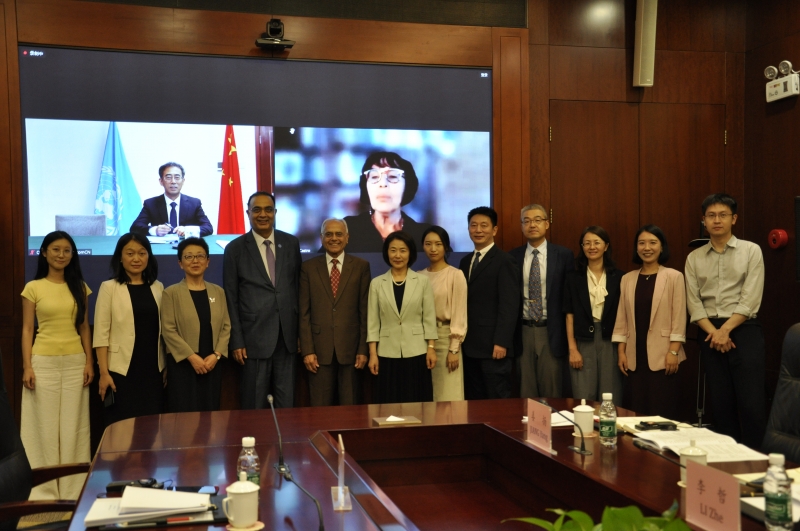On July 30, the second plenary meeting of the second Governing Board of CISTRAT was held in a hybrid format of both in person and online in Beijing. Lin Xin, Vice Minister of Science and Technology of China (MOST), attended the meeting as Chairperson of CISTRAT GB and delivered a speech. Representitives from UNESCO Regional Office for East Asia, Chinese National Commission for UNESCO, the Department of International Cooperation of MOST, as well as members of the GB from University of Sussex (UK), the Advanced Studies Institute of Federal University of Rio de Janeiro (Brazil), the International Institute of Political and Economic Studies (Serbia), Tsinghua University, and CASTED participated in the meeting. The meeting was moderated by Feng Chujian, Vice President of CASTED.

Vice Minister Lin Xin fully acknowledged the achievements since the establishment of the Second GB and expressed gratitude to the GB members for their collaboration and strong support. She pointed out that China is actively expanding international scientific and technological cooperation and integrating into the global S&T innovation governance system. As a UNESCO Category II Center focusing on STI policies, CISTRAT has remained committed to promoting sustainable development through science and technology. Each year, it organizes the “Belt and Road” International Training Workshop on Science and Technology Policy Research and Methods and actively supports a variety of UNESCO initiatives. CISTRAT has carried out a series of research and policy exchanges on topics including artificial intelligence and open science, and has gradually become an influential international platform for science and technology policy dialogue and cooperation. She encouraged CISTRAT to continue to share China’s research and practical experience in STI policies with the Global South, and further engage with UNESCO’s “International Decade of Science for Sustainable Development” initiative, making positive contributions to achieving the United Nations Sustainable Development Goals.
Liu Dongmei, Director of CISTRAT, presented to the GB the work review for 2024–2025 and the work plan for 2025–2026. She stated that over the past year, under the guidance of the MOST and UNESCO, CISTRAT has advanced training and exchanges in building capacity for science and technology innovation. It promoted academic dialogues on open science, conducted research on leveraging STI to address climate change, and studied women’s participation in science and technology innovation. CISTRAT also developed a global cooperation network and established new cooperation mechanisms for Global South countries. These efforts have achieved positive results and generated widespread impact. In the next phase, CISTRAT will expedite the renewal of agreement, strengthen training and exchanges, conduct joint research, expand its cooperation network, and continuously enhance its capacity and participation in open science and technology cooperation.
During the discussion session, GB members and other representatives spoke highly of CISTRAT’s achievements. They noted that CISTRAT has played an increasingly important role in international science and technology policy training and exchanges. They also offered suggestions on strengthening policy research, increasing support for priority groups, and promoting further science and technology policy exchanges. The meeting also discussed and approved CISTRAT’s new logo.

 No.8 Yuyuantan South Road, Haidian District, Beijing, 100038
No.8 Yuyuantan South Road, Haidian District, Beijing, 100038
 +8610 58884695 58884506
+8610 58884695 58884506
 +8610 58884678 58884588
+8610 58884678 58884588
 casted@casted.org.cn
casted@casted.org.cn
 http://www.casted.org.cn
http://www.casted.org.cn
